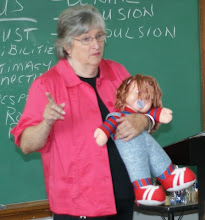Tuesday, September 1, 2009
One Potato, Two Potato, Three Potato, Four
There is a thing called projection. We are all good at it. It is an unconscious trick of the mind. It usually keeps us more comfortable. If you are the family member, you are highly likely to be the target. Think of the childhood game of Hot Potato. Projection is like that game. You can wrap up a feeling and toss it into the lap of someone else. There are other little tricks of the mind that also keep us from facing what we really feel. Denial, rationalization, minimizing, etc. but this projection thing seems to be an unknowing favorite of the addict. One fact that families need to accept is that while the severity of the addiction increases, so also do the defense mechanisms. They serve a mighty purpose and keep the addict from facing the full reality of the mess they are in. On a positive note, it might even keep a person from suicide.
BUT: the family and friends need to be aware when the potato comes their way. During my days in the family program at Brighton Hospital, a family member who arrived late was often greeted in the lobby by a patient with some guilt inducing comment such as “Why are you so late?” “You forgot to bring me clean socks.” Or “Why didn’t you call last night?” What the patient cannot express yet, for whatever reason, is all of the guilt they feel for having to be in treatment, guilt for the behaviors; guilt that the family member is spending a day in a family program. So—the guilt is now on the visitor, who, more than likely, catches the potato and begins to explain about the lateness, the socks or the phone call. Mission accomplished!
A bucket of lead is easier to carry if two people have the handle. BUT: the patient needs to slowly get honest, get in touch and begin to own their feelings. Such is necessary for recovery. AND: the family member needs to stop catching the potato. We do so over-function!
We tend to catch guilt, fear, shame, hurt, inadequacy, loneliness and a whole host of negative feelings that really are being tossed over.
It is not easy to be aware of every spud that comes your way, but one gets better at in time. In general, if you are feeling OK and suddenly find yourself explaining at length, you probably should get ready to make one large potato salad for lunch.
BUT: the family and friends need to be aware when the potato comes their way. During my days in the family program at Brighton Hospital, a family member who arrived late was often greeted in the lobby by a patient with some guilt inducing comment such as “Why are you so late?” “You forgot to bring me clean socks.” Or “Why didn’t you call last night?” What the patient cannot express yet, for whatever reason, is all of the guilt they feel for having to be in treatment, guilt for the behaviors; guilt that the family member is spending a day in a family program. So—the guilt is now on the visitor, who, more than likely, catches the potato and begins to explain about the lateness, the socks or the phone call. Mission accomplished!
A bucket of lead is easier to carry if two people have the handle. BUT: the patient needs to slowly get honest, get in touch and begin to own their feelings. Such is necessary for recovery. AND: the family member needs to stop catching the potato. We do so over-function!
We tend to catch guilt, fear, shame, hurt, inadequacy, loneliness and a whole host of negative feelings that really are being tossed over.
It is not easy to be aware of every spud that comes your way, but one gets better at in time. In general, if you are feeling OK and suddenly find yourself explaining at length, you probably should get ready to make one large potato salad for lunch.




